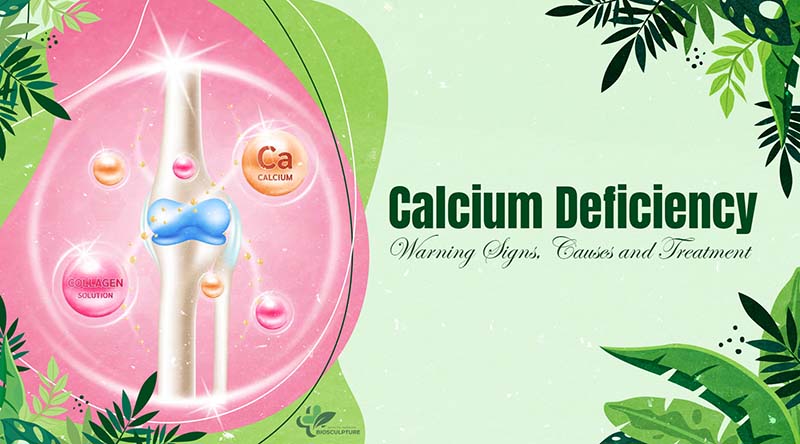Calcium is a vital mineral crucial for maintaining strong bones and teeth. Beyond its skeletal benefits, calcium is also integral to the body’s metabolism, regulating heart rate, and facilitating muscle movements. For these critical functions to be effectively carried out, the body needs to maintain a constant level of calcium in the blood and tissues. Both a deficiency and an excess of calcium can have significant adverse effects on an individual’s health. Let’s explore in the following article.

1. What Is Calcium Deficiency?
Calcium deficiency happens when there’s not enough calcium in your blood. This can be due to problems with certain glands in your body, not eating enough calcium-rich foods, or issues with your kidneys. People with low calcium might feel really tired, have trouble sleeping, and get muscle cramps or twitches. If you don’t fix this issue, it could lead to worse health problems like weak or bent bones. To prevent or fix calcium deficiency, eat more foods high in calcium or take calcium pills, and make sure to sort out any other health issues that might be causing the problem.

2. Causes of Calcium Deficiency
Many factors can lead to calcium deficiency, particularly as people get older. This deficiency can stem from:
- Consistently low calcium intake, especially important during childhood.
- Certain medications that reduce how well the body absorbs calcium.
- Inability to eat calcium-rich foods due to dietary restrictions.
- Hormonal changes, notably in women.
- Specific genetic predispositions.
Other contributors to calcium deficiency include malnutrition, where the body lacks overall nutrients, and malabsorption, where the body can’t properly take in nutrients from food. Additional reasons might be:
- Insufficient vitamin D, crucial for calcium absorption.
- Certain medications like phenytoin, phenobarbital, rifampin, corticosteroids, and others that may interfere with calcium levels.
- Health conditions like pancreatitis, abnormal magnesium levels, high phosphate levels, septic shock, significant blood transfusions, kidney failure, and some chemotherapy treatments.

Skipping calcium in your diet once in a while won’t lead to immediate deficiency, but it’s essential to maintain regular intake as the body depletes its calcium resources swiftly. Vegans might face a higher risk of calcium deficiency if they exclude dairy products, which are primary calcium sources.
The body tends to maintain its calcium levels by pulling from bone reserves, which means you might not notice immediate symptoms of deficiency. However, prolonged low calcium can lead to severe health issues.
3. Who Is at Risk of Calcium Deficiency?
Some groups of people may not get enough calcium from their diet, leading to the possibility of deficiency. These groups include:
- Individuals avoiding dairy: Since dairy products are a primary source of calcium for many, those who exclude dairy from their diets may face a higher risk of calcium deficiency due to reliance on less calcium-rich food sources.
- Postmenopausal women: Women undergo more rapid bone remodeling—breaking down and rebuilding bone tissue—after menopause. Although this process aims to repair weakened bones, the body might not rebuild bones as effectively postmenopause, especially with insufficient calcium intake, increasing the risk of deficiency.

- People lacking vitamin D and magnesium, along with those experiencing issues with parathyroid hormone production, are also more susceptible to calcium deficiency. These hormones and minerals are vital for calcium absorption from the diet and its utilization within the body. Consequently, deficiencies in vitamin D, magnesium, or parathyroid hormone can lead to lower calcium levels and hinder the body’s ability to use the available calcium.
4. Dangerous Signs of Calcium Deficiency
Early stages of calcium deficiency might not show any symptoms. But as the condition worsens, significant symptoms can develop, including:
- Confusion or memory issues
- Muscle spasms
- Numbness and tingling sensations in the hands, feet, and face
- Feelings of depression
- Experiencing hallucinations
- Muscle cramps
- Weak and brittle nails
- Bones that break easily
Calcium deficiency can impact the entire body, leading to weak nails, slower growth of hair, and skin that is fragile and thin.
Calcium is vital for releasing neurotransmitters and for muscle movements. Hence, a lack of calcium can cause seizures in people who are otherwise healthy.
If you notice neurological signs like memory loss, numbness, hallucinations, or seizures, it’s crucial to consult with your doctor promptly.
5. What Diseases Can Calcium Deficiency Cause?
Calcium deficiency can trigger a variety of diseases and health complications. Some conditions associated with calcium deficiency include:
- Osteoporosis: Long-term lack of calcium can cause osteoporosis, where bones become weak and brittle because they lose calcium faster than it can be replaced.
- Dental Issues: Low calcium levels can negatively impact oral health, leading to dental problems.
- Cataracts: A prolonged deficiency in calcium may play a role in the development of cataracts in the eyes.
- Brain Health: Calcium deficiency can affect brain function, potentially impacting overall brain health.
- Joint and Muscle Issues: Insufficient calcium intake can lead to joint pain and muscle cramps and increase the risk of developing bone diseases such as osteoporosis.

Additionally, calcium deficiency is associated with several other conditions, including high blood pressure (hypertension), hardening of the arteries (arteriosclerosis), diabetes, neurodegenerative diseases, cancer, and osteoarthritis.
6. Prevention and Treatment of Calcium Deficiency
To prevent or address calcium deficiency, incorporating more calcium into your diet is the best and simplest method. Foods high in calcium include:
- Dairy products like milk, cheese, and yogurt
- Beans
- Figs
- Broccoli
- Tofu
- Soy milk
- Spinach
- Cereals that are calcium-fortified
- Nuts and seeds, such as almonds and sesame seeds
Excessive calcium intake, known as hypercalcemia, can lead to heart disease, kidney stones, and other severe health issues.
If the deficiency is advanced, or if dietary changes and supplements don’t lead to improvement, a healthcare professional might recommend calcium injections.
7. What to Eat and Drink for Calcium Deficiency?
For managing calcium deficiency, it’s advised to obtain at least half of your daily calcium from food sources, according to experts. Here are some of the top foods rich in calcium:
- Dairy Products: Milk, yogurt, and cheese are not only high in calcium but also among the most efficiently absorbed calcium sources. Plant-based sources of calcium aren’t absorbed by your body as effectively.
- Calcium-Fortified Foods: Many cereals have added calcium. Certain brands of calcium-fortified cereals can offer up to 100 milligrams of calcium per serving.
- Canned Salmon: Beyond dairy, canned salmon is an excellent source of calcium, providing 181 milligrams in just 3 ounces. It also contains vitamin D, which enhances calcium absorption.
- Flour Tortillas: A 10-inch flour tortilla can provide around 90 milligrams of calcium, which is an easy addition for those who enjoy carbs.
- Canned Baked Beans: Four ounces of canned baked beans offer about 126 milligrams of calcium and are also a great fiber source.

8. How Long Does It Take To Correct Calcium Deficiency?
The time it takes to correct calcium deficiency can vary significantly from one person to another. Most individuals start to notice an improvement in symptoms within a few weeks after beginning treatment. However, the exact duration depends on the severity of the deficiency, the individual’s overall health, and the root causes of the deficiency. It is necessary to follow medical instructions and treatment plans provided by healthcare professionals to effectively address calcium deficiency.
9. Calcium Deficiency: When to See a Doctor?
If you’re showing signs of calcium deficiency, it’s essential to consult with a doctor. They can perform tests to measure your blood calcium levels. A deficiency is typically diagnosed when blood calcium concentrations fall below 8.8 milligrams per deciliter.
The daily recommended calcium intake for adults between 19 to 50 years old is 1,000 mg. However, older adults require more: women over 51 and men over 71 should aim for 1,200 mg of calcium daily.
In conclusion, understanding and addressing calcium deficiency is crucial for maintaining strong bones and overall health. We’ve explored the signs, effects, and ways to combat this common issue. Now, we’d love to hear from you! Share your own experiences and feedback on battling calcium deficiency. Did you find any strategies particularly effective? Your insights could help others on their journey to better health. Don’t forget to explore more insightful blogs from Biosculpture for additional health tips and guidance. Together, we can build a healthier, stronger community.


